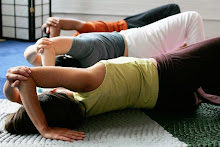Time was, you didn't discuss religion or politics, ever, except with people with whom you were intimate, and except if it was your job, like if you were a political commentator on TV. That's the way I was raised, and it has some practical value. I generally keep my views private, especially in professional or social situations. My job is to create conditions where people are able to learn something new about themselves. If I express my belief, and my client agrees with me, then all we are doing is reinforcing a habitual pattern. If I express my belief, and my client disagrees with me, then I've just put her in a position where she must resist and defend. Neither path creates conditions for real learning.
In the last several weeks, I've been fortunate to be able to learn from two of my peers visiting Houston. Fernanda Zamar, from Argentina, was visiting family and initiated a get-together for Feldenkrais exchange. Last week, Thomas Spring, a Feldenkrais teacher from New Zealand, was visiting Houston. I've been amazed at how much we had to learn from each other. It's interesting to experience another teacher's touch, to hear how they express themselves, to listen and observe the ways they bring and give attention during a lesson. After meeting and working with them, and learning from each other, I know that I have grown.
I have a magnet on my fridge that says, "Always make new mistakes." After all, if you keep making the same mistakes, it's a pretty good sign that you're not learning from them. It takes no talent, imagination, or originality whatsoever to keep doing the same thing. A mistake is the risk you take for trying something new. It's an opportunity to learn. It can even be an opportunity to explore a familiar idea, but in a new way. In this sense, Feldenkrais work is like live music. Even if you play or hear the same piece several times, it's never exactly the same. The audience, the moment, the acoustics, the emotional background of the experience all influence the final outcome in subtle and profound ways.
That's what makes it difficult to answer a seemingly simple question, like"What does Feldenkrais do for bad knees?" or back pain, or carpal tunnel, or anything? It's hard to answer, because lessons are not a pill or a protocol. The Feldenkrais Method is a remarkably ingenious way of interacting with people to help them discover new possibilities in any arena of their choosing. Since every person is different, I must constantly adapt to their needs, their learning style, and their sense of progress and accomplishment. If I don't adapt to and learn from my client, he won't be able to learn from me.
Developing your own ability to learn and adapt is your best strategy for making it through turbulent times. Learning doesn't stop when you leave your formal education. Learning is necessary to be able to use new information that can benefit you in business, in relationships, in your own health. Learning is necessary to keep pace with technological innovation. Technology shapes our lives in myriad ways. Our survival as a species through millennia has depended upon our ability to learn. Without the ability to learn, we go off-course quickly, put ourselves in danger, or become obsolete.
Here's my bias: I was an academic for over a decade. My frustration was that the emphasis was on KNOWING rather than LEARNING. The only way to "security" was to know everything. To admit that you didn't know everything, by pursuing opportunities for learning, was professional suicide. I never understood why They thought learning was a threat to knowing--didn't they support each other? Well, I'm no longer in academia, for a variety of reasons. I felt too constrained, and a majority of my colleagues felt I was not constrainable enough. The experience left me with my perception that KNOWING is static, unchanging. LEARNING is a dynamic process. Here's an illustration for you. A few years ago, I was clearing out storage boxes and bookshelves, and came across the family set of Encyclopedia Brittanica, purchased proudly in 1960. I thought for sure there would be some collector's value there, but the reality check came when I was advised that it was so outdated, I'd be better off just taking it to recycling. I couldn't get a penny for it. The major compendium of knowledge for 1960, now worthless. Today the world is changing so rapidly, information is out of date as soon as you print it. So for me, I'd rather be learning.
Which brings us back around to politics. So much of the discussion has centered around "who knows more," or less. Indeed, knowledge is vitally important. If I didn't value it, I wouldn't have stayed in academia for so long, and I wouldn't have held on to that old set of Britannica. As I look at the world, I see vast unpredictability. I want a leader who is a learner.



1 comment:
What a grand endorsement for lifelong learning. The adage "Grow or Die" reinforces your concept of always learning, Mary Beth. If we are not expanding our horizons, developing advanced technical or human skills and growing in wisdom, we are wasting a lot of time on this earth. Keep going, Mary Beth. You are growing in lovely directions. Barbara
Post a Comment